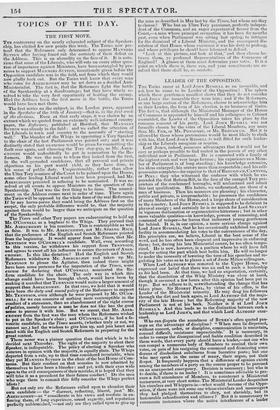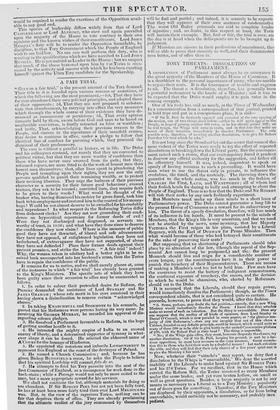LEADER OF THE OPPOSITION.
THE Tories sneer at Lord JOHN RUSSELL as an incapable, and
ask how he came to be Leader of the Opposition ? The spleen which these gentlemen manifest shows that they do not consider
Lord JOHN the incapable they term him; and if the Reformers, or any large section of the Reformers, choose to acknowledge him as their Leader, the form of his election is no business of theirs.
The fact is, that although the Ministerial Manager of the House
of Commons is appointed by himself and his colleagues in Cabinet assembled, the Leader of the Opposition takes his place by the common consent of his party. Lord JOHN RUSSELL was not formally chosen by the votes of the Liberal Members, any more than Mr. Fox, or Mr. PONSONBV, or Mr. BROUGHAM. But it is allowed by those whose pretensions would be most likely to clash with his, that Lord JOHN RUSSELL is well fitted for such leader- ship as the Liberals recognize or require.
Lord JOHN, indeed, possesses advantages that it would not be easy or perhaps possible to find united in the person of any other
individual now in Parliament. He is connected with a family of the highest rank and very large fortune; his experience as a Mem- ber of Parliament is of long standing ; his knowledge extensive, his ideas enlarged ; his oratory more than respectable ; and his self-
possession complete—far superior to that of BROUGHAM, CANNING, or PEEL: they who witnessed the coolness with which he ex-
pounded the first Reform Bill, in the face of the enraged Tory pro-
prietors of the condemned boroughs, will understand and admit this last qualification. His habits, we understand, are those of a
man of business. Then his manners are pleasing; his character, public and private, is irreproachable; he possesses the confidence of many Members of the House, and a large share of consideration
in the country. Lord JOHN RUSSELL is supposed to be deficient in physical energy ; and certainly he is no match for Lord STANLEY in vigorous declamation or argumentative bitterness ; but in other more valuable qualities—in knowledge, powers of reasoning, and command of temper—he leaves that indiscreet young gentleman far behind. It is, in our opinion, a more serious charge against Lord JOHN RUSSELL, that he has occasionally exhibited too great facility in accommodating his votes to the convenience of the day. His principles are, we believe, Liberal in the best sense of the word, and he has often been eloquent and impressive in enforcing them; but, during his late Ministerial career, he too often tempo- rized. He is now, however, in a position where be will have full scope for acting the part which best befits him. He will no longer be under the necessity of lowering the tone of his speeches and re- gulating his votes so as to please a set of Juste Milieu colleagues. When Lord ALTHORP was removed to the Upper House, we expressed our belief that there was an end to such a leadership as his had been. At that time, we had no expectation, certainly, that the dissolution of the Whig Ministry was close at hand, though it occurred a few hours after this opinion had been put in type. But we adhere to it, notwithstanding the change that has taken place. Sir ROBERT PEEL, by virtue of his office, is the Leader of the Ministerial minority. He may drag his followers through the dirt and back again, as Lord ALTHORP did the majo- rity of the late House ; but the Reforming majority of the new Parliament is not at his beck. Neither is it at Lord JOHN RUSSELL'S. And this leads us to the distinction between such a leadership as Lord Joules, and that which Lord ALTHORP exer- cised.
Who can dispute the soundness of BURKE'S often quoted pas- sage on the advantage of discipline? "When men lie dispersed, without concert, order, or discipline, communication is uncertain, counsel difficult, resistance impracticable." It is necessary, in order to escape the disorganized and feeble condition described in these words, that every party should have a leader,—not one who can compel a numerous body of Members to rescind their own votes, on pain of his resigning the command and dismissing some dozens of disobedient subalterns from lucrative posts ; but one who may speak in the name of many, their organ, not their despot. It frequently happens that a difference of opinion exists among the members of a party on the course proper to be pursued on an unexpected emergency. Decision is necessary; but who is to decide, if there is no leader ? It is sometimes advisable to pro- cure a full attendance of Members, to counteract a Ministerial manceuvre, at very short notice. The Ministerial Leader despatches his circulars and Whippers-in—what would become of the Oppo-
sition, if there were not some one whose circulars and messengers they had pledged themselves to obey, not slavishly, but in
honourable subordination and alliance ? But it is unnecessary to enumerate instances where the active interference of a leader would be required to render the exertions of the Opposition avail- able to any good end.
This species of leadership differs widely front that of Lord CASTLERE AGH or Lord ALTHORP, who once and again prevailed upon the majority of the House to vote contrary to their own opinions and the known wishes of their constituents. Lord Jonar RUSSELL'S duty will be to render the Opposition formidable, by discifiline, to that Tory Government which the People of England wish to see laid low. No one can well perform this duty, who is wanting in the qualifications which we have ascribed to Lord Jon ar Rrsset.s. Ile is yet untried as Leader in the house; but we suspect that much of the abuse bestowed upon him by f ie Tories is occa- sioned by the activity and success with which he has been exerting himself egainst the Ultra Tory candidate for the Speakership.



























 Previous page
Previous page